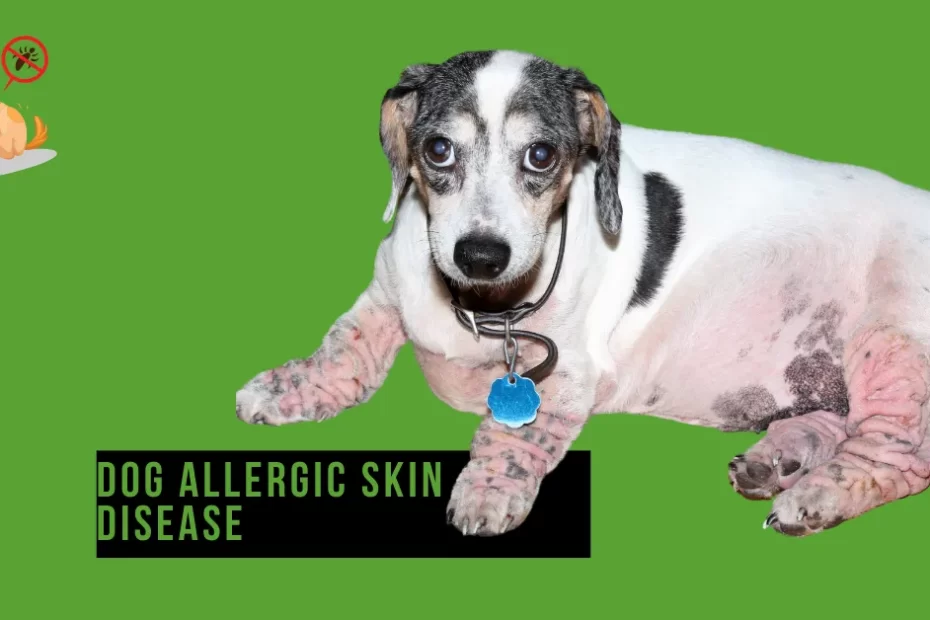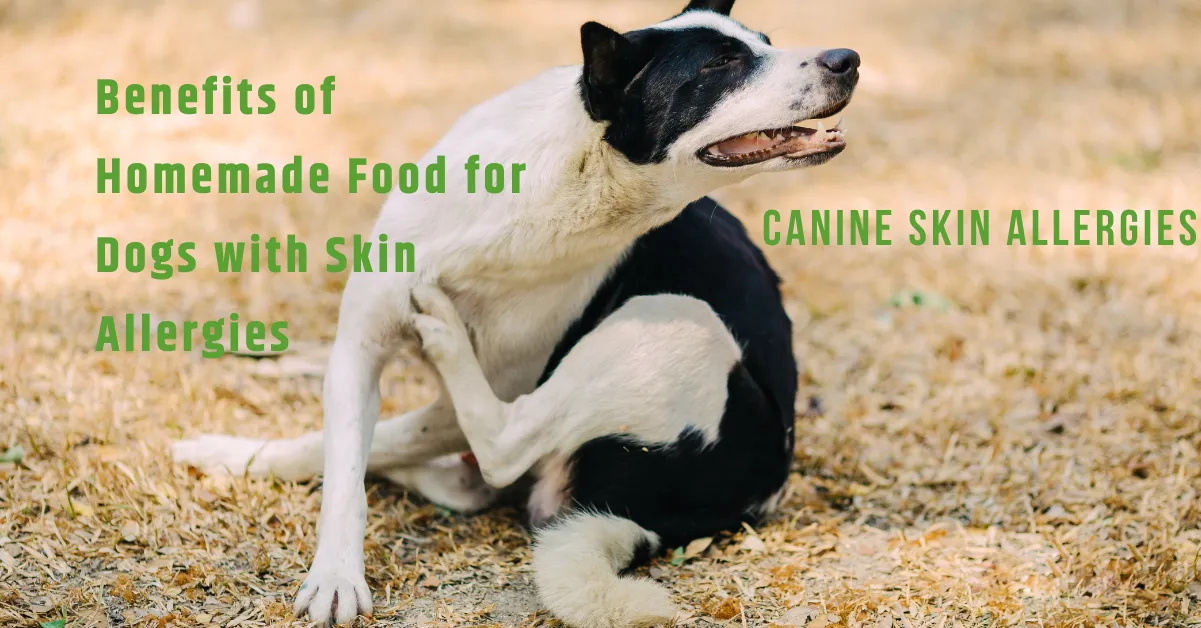Dog allergic skin disease: Dogs are man’s best friend but also have their share of health issues. One such issue is allergic reactions. If your dog suffers from allergies, homemade food recipes might be beneficial.
There are several reasons why dogs develop allergies. Some of them include environmental allergens, stress, or even genetics. The good thing is that these allergies don’t last forever. They usually go away after a specific time.
However, if your dog has developed allergies, he/she may suffer various symptoms. These symptoms include itching, sneezing, coughing, and other respiratory problems. To treat these conditions, you should try home remedies.
- Understanding and Managing Dog Allergic Skin Disease
- Homemade Food For Dog Allergic Skin Disease
- Critical Ingredients for Dogs with Skin Allergies
- Natural and Homeopathic Digestive Wellness Solutions for Pets
- Homemade Dog Food and Natural/Homeopathic Solutions: A Holistic Approach
- Source & Credits - Dog Allergic Skin Disease :
Understanding and Managing Dog Allergic Skin Disease
Skin allergies are a common problem for dogs. They can cause discomfort, itching, and skin irritation. Here’s a breakdown of the common causes, symptoms, and management strategies:
Common Causes of Canine Skin Allergies
Canine skin allergies are a common issue for many dog owners, leading to itching, discomfort, and potential skin infections. Identifying the root cause of a dog’s skin allergies is essential for effective treatment and prevention. Here are some of the most common causes:
Environmental Allergens
- Pollen, Grass, and Mold: Like humans, dogs can be sensitive to seasonal allergens like pollen, grass, and mold. Exposure often leads to itching, redness, and rashes, especially in paws, belly, and ears.
- Dust Mites: Indoor allergens such as dust mites can also affect dogs, particularly those that spend a lot of time indoors. Symptoms might persist year-round and include itching, licking, and skin irritation.
Food Allergies
- Protein Sources: Dog food allergies are often triggered by specific proteins in ingredients like beef, chicken, dairy, or eggs. These allergies can result in skin-related symptoms such as itching, hot spots, and inflamed skin.
- Additives and Preservatives: In some cases, artificial additives or preservatives in dog food can cause allergic reactions, leading to skin issues and digestive disturbances.
Flea Allergy Dermatitis
- Flea Bites: Flea saliva is a potent allergen for many dogs, and just a single flea bite can trigger a severe allergic reaction known as Flea Allergy Dermatitis. Dogs with FAD often experience intense itching, hair loss, and inflamed, scabbed skin, particularly around the tail base and hindquarters.
Genetic Predisposition
- Breed-Specific Allergies: Some breeds, like Bulldogs, Retrievers, and Terriers, are more prone to allergies due to genetic factors. These dogs may have a predisposition to develop allergies throughout their lives, often requiring ongoing management.
- Inherited Skin Conditions: Conditions like atopic dermatitis can be genetically inherited, causing chronic itching and recurrent skin infections.
Bacterial and Fungal Infections
- Secondary Infections: When allergies lead to excessive scratching or licking, they can disrupt the skin’s natural barrier, making it more susceptible to bacterial or fungal infections. These infections exacerbate allergy symptoms and may lead to pus, swelling, or odor from the affected area.
Hormonal Imbalances
- Thyroid Issues: Dogs with hypothyroidism or other hormonal imbalances can develop dry, itchy skin that mimics allergic reactions.
- Cushing’s Disease: Cushing’s disease, a hormonal disorder, may also cause skin issues that resemble allergic reactions, including thinning fur and patches of scaly, red skin.
Symptoms of Canine Skin Allergies
Canine skin allergies can manifest in various symptoms, affecting a dog’s skin, coat, and behavior. Identifying these symptoms early is crucial for effective treatment and to prevent further complications, such as secondary infections. Here are common symptoms of skin allergies in dogs:
Itching and Scratching
- Persistent Scratching: One of the primary signs of skin allergies in dogs is constant scratching, often focused on specific areas like the paws, ears, and belly.
- Excessive Licking and Chewing: Dogs with skin allergies often lick or chew their paws and other body parts to relieve itching. This behavior can lead to sores and hair loss.
Redness and Inflammation
- Irritated Skin: Allergies can cause red, inflamed skin, especially in areas with less fur, such as the abdomen and inner thighs.
- Hot Spots are inflamed, moist skin patches that result from excessive licking or scratching. They often appear suddenly and need prompt treatment.
Dry and Flaky Skin
- Dandruff: Allergies can lead to dry, flaky skin, which causes dandruff to be visible on the dog’s coat and bedding.
- Scaly Patches: In some cases, skin allergies cause rough, scaly areas on the skin, often accompanied by hair loss.
Ear Infections
- Frequent Head Shaking and Ear Scratching: Allergic dogs are prone to ear infections, which can cause head shaking and scratching around the ears.
- Odor and Discharge: Ear infections related to allergies can cause a foul odor, redness, and discharge from the ears. Chronic ear infections are prevalent in dogs with food and environmental allergies.
Swelling and Hives
- Raised Bumps or Hives: Allergic reactions may cause raised bumps or hives, especially if the dog has encountered an irritant allergen.
- Swelling of the Face or Paws: In some cases, dogs experience localized swelling around the face, muzzle, or paws due to an allergic reaction.
Hair Loss and Coat Changes
- Patchy Hair Loss: Excessive licking, scratching, or chewing often leads to thinning fur or bald patches, particularly around irritated areas.
- Coat Texture Changes: Allergies can affect the texture of a dog’s coat, making it appear dull or brittle.
Behavioral Changes
- Increased Restlessness: Dogs with allergies may become restless or anxious due to constant discomfort.
- Irritability: The chronic itch and discomfort caused by allergies can lead to behavioral changes, such as increased irritability or avoidance behaviors.
Odor from Skin Infections
- Unpleasant Smell: Secondary bacterial or fungal infections, often due to persistent scratching, can produce a strong, unpleasant odor from the skin.
- Crusted Areas: Allergies can lead to open sores or crusty patches that may have a distinct smell, indicating infection.
Managing Dog Allergic Skin Disease
1. Veterinary Consultation:
- Diagnosis: A veterinarian can diagnose the specific cause of the allergy through tests like blood tests or skin scrapings.
- Treatment Plan: A tailored treatment plan may involve:
- Medicated Shampoos: To soothe irritated skin and reduce inflammation.
- Medications: Antihistamines, corticosteroids, or other medications to manage symptoms.
- Dietary Changes: A hypoallergenic diet to eliminate potential food allergens.
- Environmental Control: Minimizing exposure to allergens through regular cleaning, air purifiers, and avoiding triggers.
2. Home Care:
- Regular Grooming: Regular brushing can help remove allergens and reduce shedding.
- Bathing: Use gentle, hypoallergenic shampoos to cleanse the skin without irritating it.
- Avoid Harsh Chemicals: Avoid using harsh chemicals or perfumes on your dog’s skin.
- Monitor for Secondary Infections: Check your dog’s skin for signs of infection, such as pus or increased redness.
3. Natural Remedies:
- Omega-3 Fatty Acids Can help reduce inflammation and improve skin health.
- Probiotics: Can support gut health and immune function.
- Herbal Remedies: Certain herbs like chamomile and calendula may soothe irritated skin.
By working closely with your veterinarian and implementing these strategies, you can help your dog manage their skin allergies and live a comfortable life.
Homemade Food For Dog Allergic Skin Disease
Homemade food can be a helpful option for dogs with skin allergies, as it allows you to control every ingredient and tailor meals to avoid allergens. Dogs with food sensitivities or allergies often benefit from simple, hypoallergenic diets that eliminate common allergens and include ingredients that promote healthy skin and coat.
Here’s a guide on homemade food for dogs with skin allergies, including ingredients that may help alleviate symptoms.
Benefits of Homemade Food for Dogs with Skin Allergies
-
Allergen Control:
-
Homemade meals let you eliminate common allergens like beef, chicken, dairy, or wheat, which are often triggers for sensitive dogs.
-
-
Balanced Nutrition:
- You can ensure your dog gets a balanced diet rich in vitamins, minerals, and healthy fats that support skin health.
-
Fresh Ingredients:
- Whole foods can improve overall health and immune function, potentially reducing allergy symptoms.
Critical Ingredients for Dogs with Skin Allergies
Proteins
Use proteins your dog hasn’t eaten before, such as duck, rabbit, or bison. These proteins are less likely to trigger allergies.
Turkey, lamb, or salmon are often well-tolerated and rich in amino acids that support healthy skin and coat
Carbohydrates
Choose gentle carbohydrates like sweet potatoes, pumpkin, or quinoa, which are less likely to cause allergic reactions.
Supplements for Skin Health
Consider adding supplements to support skin health, such as probiotics for digestion, fish oil for omega-3 fatty acids, or even turmeric (in small amounts) for its anti-inflammatory benefits.
Sample Recipe: Simple Salmon and Sweet Potato Meal
This recipe combines skin-friendly ingredients like salmon, sweet potato, and green beans for a balanced, hypoallergenic meal. Adjust portions according to your dog’s weight and activity level, and always consult your veterinarian before starting a new diet.
Ingredients:
Important Considerations
- Gradual Transition: When switching to homemade food, gradually introduce it over several days to avoid digestive upset.
- Consult a Veterinarian: Homemade diets should be discussed with your veterinarian to ensure they meet your dog’s nutritional needs, especially for dogs with health issues.
- Avoid Common Allergens: Be aware of ingredients that can exacerbate skin allergies, such as beef, chicken, corn, and soy, and avoid them if they trigger symptoms in your dog.
- Supplements: Homemade diets often require additional calcium and vitamin D supplements to be fully balanced. Consult your vet to determine if these are needed.
Final Tips
Creating homemade meals tailored for dogs with skin allergies can significantly improve their comfort and quality of life.
The key is to choose hypoallergenic ingredients that provide balanced nutrition, avoid common allergens, and support the skin with anti-inflammatory foods and omega-3-rich ingredients.
With proper planning and guidance from a veterinarian, homemade food can be a valuable tool in managing your dog’s skin allergies.
Natural and Homeopathic Digestive Wellness Solutions for Pets
Natural Homeopathic Digestive Wellness Solutions Collection, meticulously crafted to support your pet’s digestive health. Trusted by over 46,000 pets in more than 80 countries, our selection offers gentle yet effective remedies for digestive issues. Help your pet thrive with our premium-quality products.
Homemade Dog Food and Natural/Homeopathic Solutions: A Holistic Approach
Understanding the Connection
The rising popularity of homemade dog food and natural/homeopathic solutions for dogs is a testament to the growing trend of holistic pet care. Both approaches aim to provide optimal health and well-being for dogs by minimizing artificial additives and chemicals.
Here’s how these two concepts are interconnected:
-
Control Over Ingredients:
- Homemade Dog Food: By preparing your dog’s food at home, you have complete control over the ingredients used. This allows you to avoid artificial preservatives, fillers, and potential allergens.
- Natural/Homeopathic Solutions: These remedies often use natural ingredients and holistic approaches to address various health concerns.
-
Addressing Underlying Issues:
- Homemade Dog Food: A well-balanced homemade diet can help address specific health issues, such as allergies, digestive problems, or weight management.
- Natural/Homeopathic Solutions: These remedies can help support overall health and address specific conditions, such as anxiety, joint pain, or skin allergies.
-
Holistic Approach to Health:
- Both approaches emphasize a holistic view of a dog’s health, considering physical, mental, and emotional well-being.
- They often complement each other, providing a comprehensive approach to canine health.
Source & Credits – Dog Allergic Skin Disease :
https://www.petmd.com/dog/wellness/evr_dg_remedies-for-upset-stomach-in-dogs
https://www.thesprucepets.com/homemade-puppy-food-4174007
https://vcahospitals.com/know-your-pet/food-allergies-in-dogs

